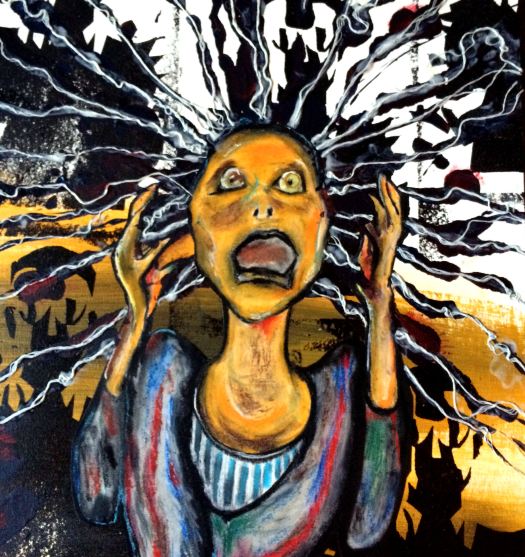Freedom From Religion: Campaign to Support CRPD
http://muddledtranslation.blogspot.no
Freedom of Religion, Freedom from Religion: A Psychotherapy Survivor’s Account of Unravelling the Colossal Irony
By Eveline Zenith
Our freedom to believe and practice as we choose is correlated with the core values of liberty and autonomy. The Canadian Charter of Rights and Freedoms protects our rights by stating that everyone has freedom of conscience and religion; also, religious belief cannot be preferred to non-belief. In the United States, freedom of religion is constitutionally protected in the First Amendment, and is associated with the separation between church and state.
Freudian psychoanalysis is a religious ideology that has absolutely no relevance in my life. I can only say that now I have researched it in depth, and this has been no simple task. Finding information about this clandestine methodology required: hours of detective work; a small fortune of books; under-cover attendance at a psychoanalytic seminar; six months of email correspondence with a psychoanalyst; intensive abuse recovery; jumping through every possible hoop in the system… and it remains today irredeemable. I did all this in order to regain sanity after therapy; my mind became so scrambled I had to abruptly discharge myself from the transaction. I am staggeringly aware of how lucky I am.
I had a nervous breakdown and began constantly re-living the bizarre statements my analyst had said to me. They were all vague and stated in a slow hypnotic tone, by a man who had been presenting as a “blank slate”. I had absolutely no familiarity or understanding of him: his intentions, beliefs, or personality. With sheer terror I would wake at 3am… trembling, eyes watering, remembering his intense staring, cutting words, sadistic glee, and condescending manner. There were other times when I felt bonded with him, that he cared, that he was a spiritual guide. The cognitive dissonance alone was torture enough to drive me insane!
Once I went “no contact” all my illusions disintegrated; I became appallingly aware of the prospect that he had deliberately abused me. He has the power, the education, and the techniques at his disposal to really screw me just for kicks. The research I have done on emotional abuse is a succinct match to the so-called techniques; I was vulnerable and had no idea what I was consenting to. He would simply shift the goalposts whenever I grew wise; he’d divert to blaming my hyper-vigilance and trust issues.
I never imagined I would have to defend my human dignity to an institution that is supposed to protect me, or that they would dismiss my testimony and actually try to silence me. The greatest, deepest betrayal was that it was an endeavour to heal from childhood abuse. That therapist held the keys to my most defenseless wounds and senselessly battered them. There is still no accountability on behalf of the profession: either this is considered permissible, or this practitioner needs to be corrected.
I have learned that Freudian psychoanalysis – perhaps psychotherapy on the whole – holds the absolute belief that the pathological relationship will inevitably re-enact. What this means is that if you were abused before, you will re-experience it in therapy and be re-traumatized. I have not yet found anyone in the field who will explain in plain language how this works; it makes no rational sense. This is an accessibility issue. Not only is it illogical, it is downright heinous without mandatory informed consent. Currently, the authorities assume on good faith that the practitioner will inform the client. If you have any knowledge of the world of predators, abuse, and exploitation, you will know this is a loophole for corruption. Also, if you don’t understand this is the process, you will only experience your therapist as your abuser and hopefully get out of it like I did!
There is no therapeutic value in having your spiritual guide manifest as your worst nightmare unless there is a therapeutic alliance; this can only be forged through informed consent every step of the way. Sex, boxing, and psychotherapy are similar: if one person isn’t participating it’s a crime. Psychoanalysis believes practitioners can subject us to treatment because they feel we need it; they have a plan for us, but they don’t reveal it. There are plenty of ethics seminars where theories are discussed about what’s good or bad for clients, but no actual observance of human rights is mandated. The entire “treatment” goes on in complete privacy, with biased accounts of clients’ “transferences” scratched on notepads for billing purposes. I never consented to any transference; I assumed everything was in the here and now. All of this religious interpretation was done behind my back so there was no way I could refute it, question it, challenge it, or even benefit from it. I have searched far and wide in a vast wilderness of possibilities, finally concluding that my practitioner is delusional, sadistic-aggressive, lacks empathy, and has no substantive reasoning for any of it besides money and control. This conclusion is the reason I am alive and well today.
The imperative reason I advocate for the absolute prohibition of coercive treatments is because this harm is done to the previously harmed, vulnerable, and voiceless members of our society. These are people who have had cruel, devastating, and heinous things done to us; large parts of our bodies and souls have been murdered. Even with all the agency I possess, I can’t get through to anyone on the other side of the door. The lack of education and total absence of conversation about abuse in the mental health profession is criminal negligence, considering that is the number one reason people use these services. Although the Code of Ethics for Psychiatry explicitly states informed consent, I am told by the authorities I consented simply by being there.
In terms of CRPD principles, although many sections address aspects of this problem I focus on sections 14 through 16:
Article 14: Liberty and security of the person
- States Parties shall ensure that persons with disabilities, on an equal basis with others:
(a) Enjoy the right to liberty and security of person;
(b) Are not deprived of their liberty unlawfully or arbitrarily, and that any deprivation of liberty is in conformity with the law, and that the existence of a disability shall in no case justify a deprivation of liberty.
- States Parties shall ensure that if persons with disabilities are deprived of their liberty through any process, they are, on an equal basis with others, entitled to guarantees in accordance with international human rights law and shall be treated in compliance with the objectives and principles of this Convention, including by provision of reasonable accommodation.
Article 15: Freedom from torture or cruel, inhuman or degrading treatment or punishment
- No one shall be subjected to torture or to cruel, inhuman or degrading treatment or punishment. In particular, no one shall be subjected without his or her free consent to medical or scientific experimentation.
- States Parties shall take all effective legislative, administrative, judicial or other measures to prevent persons with disabilities, on an equal basis with others, from being subjected to torture or cruel, inhuman or degrading treatment or punishment.
Article 16: Freedom from exploitation, violence and abuse
- States Parties shall take all appropriate legislative, administrative, social, educational and other measures to protect persons with disabilities, both within and outside the home, from all forms of exploitation, violence and abuse, including their gender-based aspects.
- States Parties shall also take all appropriate measures to prevent all forms of exploitation, violence and abuse by ensuring, inter alia, appropriate forms of gender- and age-sensitive assistance and support for persons with disabilities and their families and caregivers, including through the provision of information and education on how to avoid, recognize and report instances of exploitation, violence and abuse. States Parties shall ensure that protection services are age-, gender- and disability-sensitive.
- In order to prevent the occurrence of all forms of exploitation, violence and abuse, States Parties shall ensure that all facilities and programmes designed to serve persons with disabilities are effectively monitored by independent authorities.
- States Parties shall take all appropriate measures to promote the physical, cognitive and psychological recovery, rehabilitation and social reintegration of persons with disabilities who become victims of any form of exploitation, violence or abuse, including through the provision of protection services. Such recovery and reintegration shall take place in an environment that fosters the health, welfare, self-respect, dignity and autonomy of the person and takes into account gender- and age-specific needs.
- States Parties shall put in place effective legislation and policies, including women- and child-focused legislation and policies, to ensure that instances of exploitation, violence and abuse against persons with disabilities are identified, investigated and, where appropriate, prosecuted.


